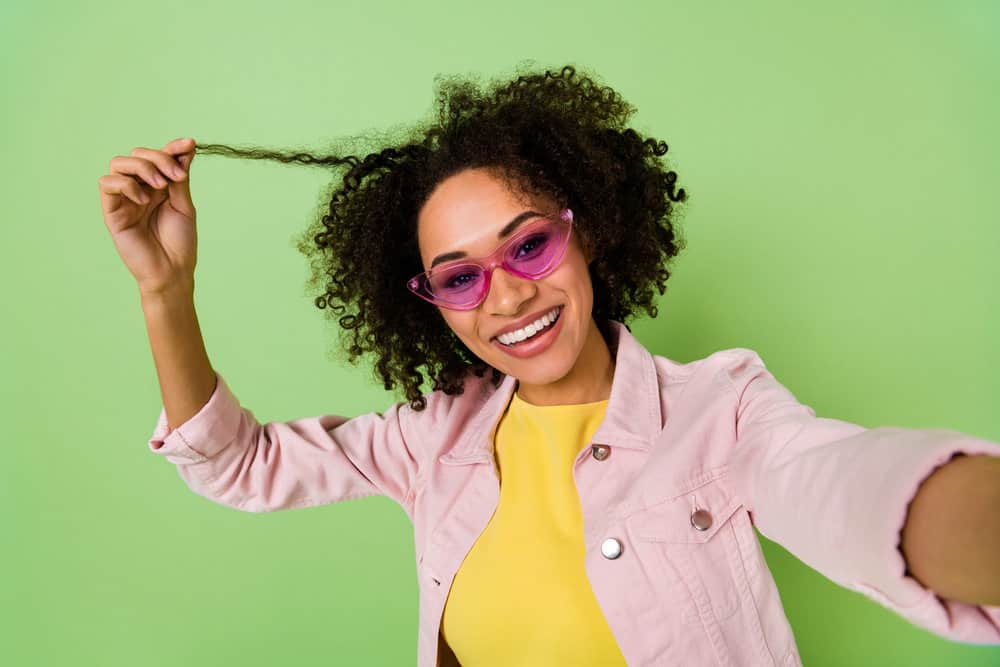
If you've ever taken a strand of your hair and stretched it, you've witnessed your hair's elasticity. It's a measure of hair's health, and that's why every curly girl should know how elastic their hair is at any point.
That information can yield valuable insight into how to care for your hair.
In this article, we'll tell you why your hair is elastic, what affects hair elasticity levels, and how you can use that information to better care for your strands.
Table of Contents
Why Is My Hair Elastic?
In most cases, your hair is elastic because it's healthy. Hair with medium to high elasticity has enough moisture to enable the strands to stretch and then return to their normal state without damage. In other words, your hair is elastic because it's adequately nourished.
Low elasticity hair, on the other hand, is dry and brittle.
This type of hair snaps rather than stretches because it lacks the moisture needed to be flexible and resilient. If your hair breaks rather than stretches, that's a sign that it's time to step up your moisture game.
Hyper elasticity is when your hair stretches very far and doesn't go back to its normal state. This is usually a sign of over-moisturized hair with insufficient protein levels. Due to the lack of protein, your hair becomes mushy and gummy, leading to stretchy, stringy strands.

How Elastic Should the Hair Be?
Healthy hair should stretch to about 1.2-1.5 times its length before breaking. If you don't want to measure your hair strand and do a test, you can quickly take one of your strands between your fingers and gently stretch it out. If it breaks instantly when you start to stretch it, you have low elasticity and need to focus on increasing moisture levels.
What Affects Hair Elasticity?
Now that you know what causes your hair to be elastic (or not), let's explore the factors that affect hair elasticity.

How Often You Heat Style
If you heat style your hair regularly, you're probably causing some damage. Heat styling can zap moisture from your strands, leading to dry, brittle hair that lacks elasticity. To boost hair elasticity, cut back on heat styling and use protective products when you style with heat.
Whether You Protect Your Hair at Night
If you don't protect your hair at night, you could experience a change in hair elasticity. When you sleep, your hair rubs against your pillow, causing friction that can zap moisture from your strands and reduce hair elasticity.
To prevent this, sleep with a satin pillowcase or scarf. Either will create a smooth surface for your hair to glide against, preventing moisture loss.

The Health of Your Scalp
Your scalp is the foundation for healthy hair, so it's no surprise that a nourished scalp leads to hair with healthy elasticity levels. A healthy scalp is free from build-up, dandruff, and dryness.
To achieve a healthy scalp, use a clarifying shampoo to remove build-up and follow up with a hydrating conditioner. You can also use a scalp mask or oil to nourish your scalp and promote healthy hair growth.
How Much Water You Drink
Your hair is made up of about 25% water. That's not very much, but it's enough to make a difference in your hair's elasticity. When you don't drink enough water, your body steals moisture from your hair to compensate for the shortfall.
This can leave your strands dry, brittle, and lacking in elasticity.
To prevent this, drink plenty of water throughout the day. A general guideline for water intake is 8 cups per day, but you may need more or less depending on your activity level, body weight, and the climate you live in.

The Shampoo You Use
What type of shampoo do you use? It could be affecting your hair elasticity. A sulfate-free shampoo is ideal for people with low elasticity hair because it's gentle and won't strip moisture from your strands.
You should also follow up with a super hydrating conditioner to provide further nourishment. If you have high elasticity hair, you can use any type of shampoo as long as it doesn't contain harsh ingredients that could damage your hair.
Your Hair Moisturizing Habits
If your hair moisturizing routine is lacking, that could affect your hair elasticity. When your curls don't get enough moisture on a regular basis, they get thirsty and lose elasticity.
To prevent this, make sure to deep condition your hair at least once a week and use a leave-in conditioner or cream daily. You can also use hot oil treatments for an extra boost of hydration.

Whether You Use Bleach, Dyes, or Other Chemical Treatments
If you use bleach, dyes, or other chemical treatments often, your hair is probably screaming for moisture. Elasticity issues are common among those who get relaxers and texturizers or regularly get their hair colored.
The reason why is that these treatments penetrate your hair's cuticle to change its inner structure or color. Whenever that happens, your hair cuticles never return to their normal state.
It's normal for your hair to be dry and inelastic following chemical treatment.
In fact, it's expected. To help your hair recover, you'll need to up the moisture in every step of your hair care routine. Once your hair's moisture levels return to normal, you should see an improvement in elasticity.
Another issue that chemical treatments can cause is excessive elasticity.
This is when your hair becomes so elastic that it breaks easily. If you notice this happening, you'll need to take a break from all chemical treatments and switch to TLC mode.
Use products that contain protein to help strengthen your strands. Treatments like Olaplex can also help to fortify and repair your strands and improve your hair's overall elasticity.

What Happens if You Do Nothing About Your Hair Elasticity Problems?
It's a mistake to think that your hair elasticity issues will remedy themselves; though it may happen in some cases, chances are slim.
If you don't do anything to improve the elasticity of your hair, you'll probably notice that your hair becomes more and more damaged over time. It may become frizzy, brittle, and weaker overall.
You may also notice that damaged hair becomes difficult to style and manage.
In extreme cases, you could develop bald spots or patches of fragile hair. So, if your hair is showing signs of low or extremely high elasticity, the time to do something about it is now.

When to Consult a Professional About Hair Elasticity
People often hesitate to request professional help, but this shouldn't be the case. If you've tried all the tips above and your hair elasticity problems persist, it may be time to consult a professional.
A dermatologist or trichologist can help to diagnose the underlying cause of your hair elasticity issues and recommend a treatment plan. They may also be able to prescribe topical medication or suggest a more intensive treatment.
You can also take a trip to your local hairstylist for a consultation; a well-educated stylist may be able to pinpoint the issue and tell you exactly how to remedy it.
Hair elasticity is a vital part of having healthy, strong hair. By understanding what causes elasticity issues and how to fix them, you can keep your hair looking its best.
We hope this article has helped you better understand hair elasticity and how to achieve optimal levels for your hair. You've now got all you need to get started on the road to healthier hair!




